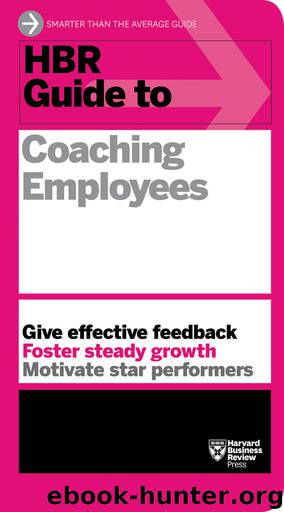HBR Guide to Coaching Employees (HBR Guide Series) by Harvard Business Review

Author:Harvard Business Review
Language: eng
Format: epub
Publisher: Harvard Business Review Press
Published: 2012-09-13T16:00:00+00:00
Foster a Growth Mind-Set
As discussed earlier in this guide, people have two basic mind-sets about development: Those with a fixed mindset view qualities such as intelligence and talent as predetermined and unchanging, while those with a growth mind-set believe that these qualities can be enhanced through dedication and effort. (See chapter 1, “Shift Your Thinking to Coach Effectively.”) Research by Stanford psychologist Carol Dweck demonstrates not only the impact of mind-set on performance but also the relative ease with which people can shift mind-sets. As she has observed, “Just by knowing about the two mind-sets, you can start thinking and reacting in new ways.”
A growth mind-set yields substantial benefits in a self-coaching context: When people view themselves as works in progress, they remain open to learning and change. They’re more persistent in seeking solutions to problems, more resilient in the face of setbacks, and more receptive to critical feedback. They also learn more from their mistakes, as research by Michigan State psychologist Jason Moser indicates, in part because they don’t get as upset by failures, and they spend more time assessing what went wrong.
Encouraging a growth mind-set doesn’t mean simply offering praise and avoiding criticism; it means focusing your feedback—both positive and negative—on employees’ efforts to accomplish their goals, not on their inherent abilities. When we praise people for their talents or criticize them for their inadequacies, they adopt a fixed mindset, undermining their attempts to self-coach. But when we praise them for their determination and criticize flagging effort, they’re more likely to adopt a growth mindset, which makes self-coaching easier and more fruitful.
You can further support a growth mind-set by viewing setbacks as learning opportunities. While you should provide candid feedback when employees fail, emphasize the value of learning from the experience. Respond to failures with an attitude of curiosity and a commitment to understanding root causes, and highlight areas where greater determination or persistence might have resulted in success.
Download
This site does not store any files on its server. We only index and link to content provided by other sites. Please contact the content providers to delete copyright contents if any and email us, we'll remove relevant links or contents immediately.
| Bookkeeping | Business Mathematics |
| Business Writing | Communications |
| Decision Making | Negotiating |
| Project Management | Running Meetings & Presentations |
| Secretarial Aids & Training | Time Management |
| Training |
Nudge - Improving Decisions about Health, Wealth, and Happiness by Thaler Sunstein(6633)
Deep Work by Cal Newport(5461)
Principles: Life and Work by Ray Dalio(5321)
The Doodle Revolution by Sunni Brown(4042)
Factfulness: Ten Reasons We're Wrong About the World – and Why Things Are Better Than You Think by Hans Rosling(4021)
Thinking in Bets by Annie Duke(3530)
Eat That Frog! by Brian Tracy(3512)
Writing Your Dissertation in Fifteen Minutes a Day by Joan Bolker(3298)
Visual Intelligence by Amy E. Herman(3281)
Hyperfocus by Chris Bailey(3267)
How to win friends and influence people by Dale Carnegie(2826)
How to Win Friends and Influence People in the Digital Age by Dale Carnegie & Associates(2819)
Schaum's Quick Guide to Writing Great Short Stories by Margaret Lucke(2801)
Hidden Persuasion: 33 psychological influence techniques in advertising by Marc Andrews & Matthijs van Leeuwen & Rick van Baaren(2777)
The Pixar Touch by David A. Price(2739)
Ogilvy on Advertising by David Ogilvy(2682)
The Slow Fix: Solve Problems, Work Smarter, and Live Better In a World Addicted to Speed by Carl Honore(2574)
Work Clean by Dan Charnas(2562)
The Content Trap by Bharat Anand(2493)
